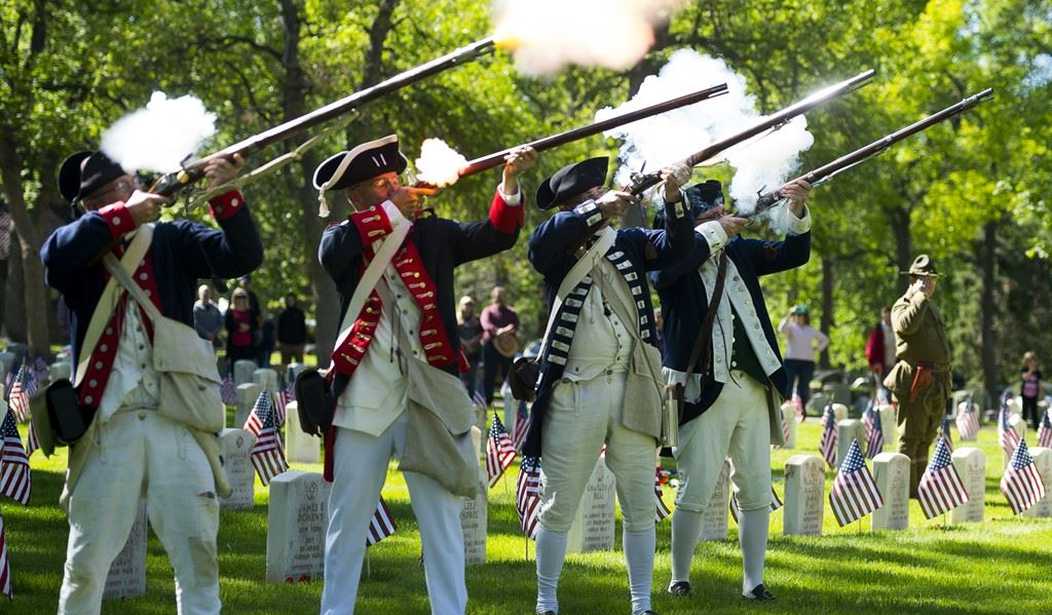This column was co-authored by Dave Dougherty.
Often, the Revolutionary War is compared to all the other bloody revolutions of the 19th century. Contrary to popular belief, the American colonists were after more than just revenge, wealth, or fame. They were after the protection of their homeland and inborn rights that their country was based upon. In Larry Schweikart and Dave Dougherty’s latest book, The Politically Incorrect Guide ® to The American Revolution: Making America Great in the First Place, they unveil true account of the American colonists in the dignified quest for independence, liberty, and human dignity.
Here are the 5 ways the American Revolution was different from other Revolutions…
1. In the American Revolution, the colonist leaders obeyed the will of the citizens, not vice versa.
Other scholars—the ones who don’t hate America—have referred to the Declaration of Independence as “The Great Declaration.” We submit that it’s time to change the name of the American Revolution to “The Great Revolution,” for it, unlike any other, changed all of history for the good. America’s revolution was the first in history to assert that ordinary people could tell their leaders what to do, and not the reverse.
2. The outcome of the American Revolution resulted in a stable Republic.
Our revolution immediately became the model for many other revolutions—beginning with the flawed French Revolution. Yet America’s stuck and France’s did not. The American Revolution resulted in the foundation of a stable and prosperous republic. Elsewhere, revolutions were followed by countless other revolutions, coups, and wars. The only major issue the American Revolution left unresolved—the full application of the phrase “all men are created equal” to slaves in America—was resolved in the Civil War. As bloody as that was, the U.S. government never stopped functioning, and the U.S. Constitution never ceased operating. Indeed, the ultimate result of that Civil War was to apply the rights guaranteed by the Constitution and the Declaration’s bold statement that “all men are created equal” to all.
Recommended
3. Unlike the Russian, French, or English Revolutions, the Revolutionary War never underwent an extremely violent phase, glutted with beheadings and torture.
What made the American Revolution different? In The Anatomy of a Revolution, Crane Brinton tried to find a common thread among the American, French, English, and Russian revolutions, but he had to admit that the American Revolution was different—it never went through a truly violent stage like those that infected all the others—leading him to conclude that the American Revolution wasn’t a revolution at all! In fact, it was, but it differs dramatically from all the other revolutions because America differs dramatically from all other nations.
4. “American Exceptionalism” was the origin for the Revolution.
The United States is unique, exceptional. Many today shy away from the phrase “American exceptionalism,” finding it jingoistic, but it is the reality. American exceptionalism rests on four pillars found nowhere else—at least not going back to the origin of any other country: 1) a Protestant religious foundation; 2) the common law; 3) private property with written titles and deeds; and 4) a free market economy. England had the last three traits, but not true Protestantism. England was originally Catholic, and even when the Church of England broke away from Rome, it was still a copy of the Catholic Church, with top-down governance. Germany had common law under the Germanic tribes, but not after Napoleon conquered Europe and installed civil law (if they had not lost it before then). Many of the Asian Tigers have free markets (more or less) and private property rights, but they have never had common law or the Christian religion. And on and on. Only America, from her inception, has had all four.
5. Unlike the initiators of other international revolutions, American colonies were truly threatened.
So from the beginning the American people had both a religious and a political philosophy of bottom-up governance. That explains why British attempts to regulate trade and introduce new taxes and laws that even potentially threatened to allow top-down control of the American colonies were viewed with sheer terror and united the colonists immediately
The American Revolution was truly exceptional as compared to other worldwide revolutions around the same time. The values and integrity held by the American colonists differed from other revolutionaries in history. Their freedom was truly under attack from an outsider, and they were fully determined to overcome this threat. The events of this war for independence and its results bring to light the truth about their pursuit of justice and the honor involved in the colonists taking up arms against their foes.
The Politically Incorrect Guide® to The American Revolution: Making America Great in the First Place is a thorough and historically accurate description of the American War for Independence—from Europeans settling in the New World and the “shot heard around the world,” to the positive aftermath of the American pursuit for freedom. Schweikart and Dougherty cut through the liberal nonsense and tell the true story behind the American War for Independence.

























Join the conversation as a VIP Member